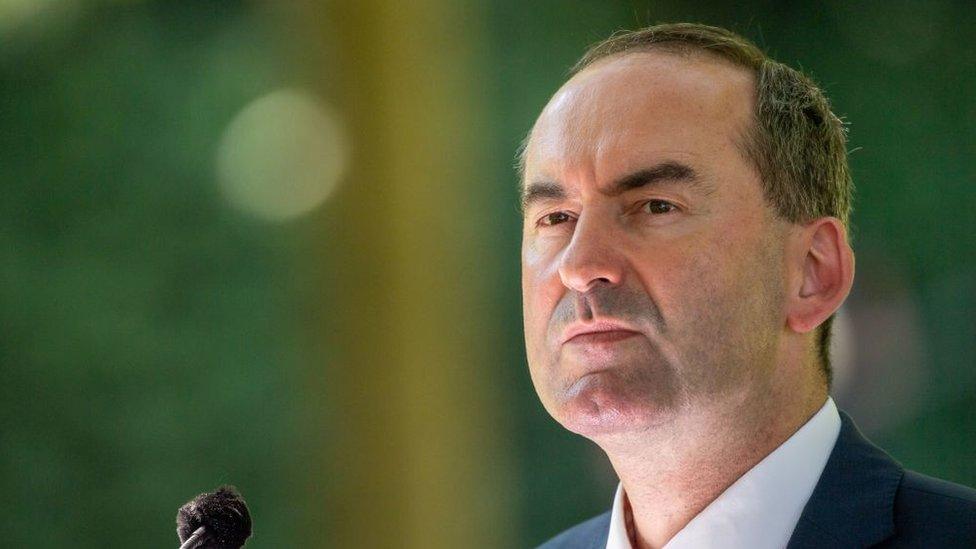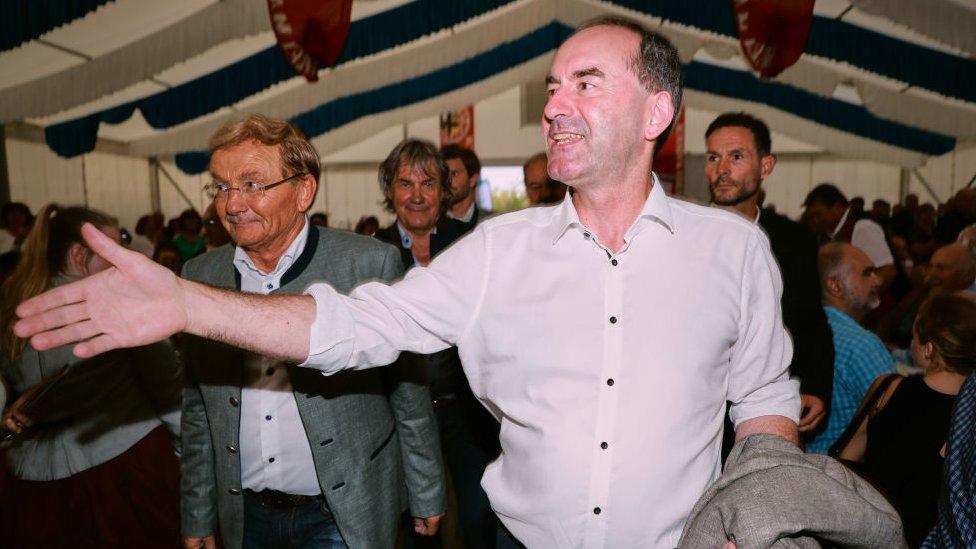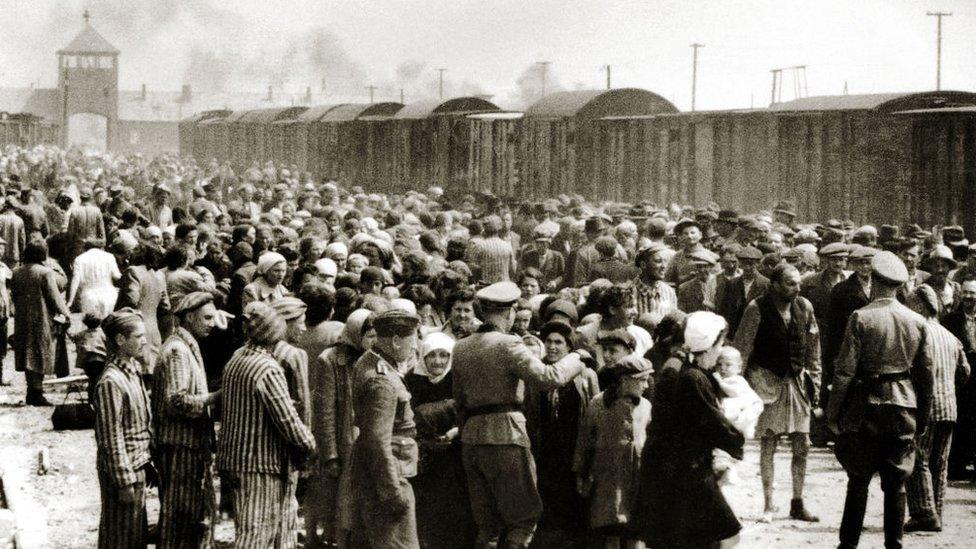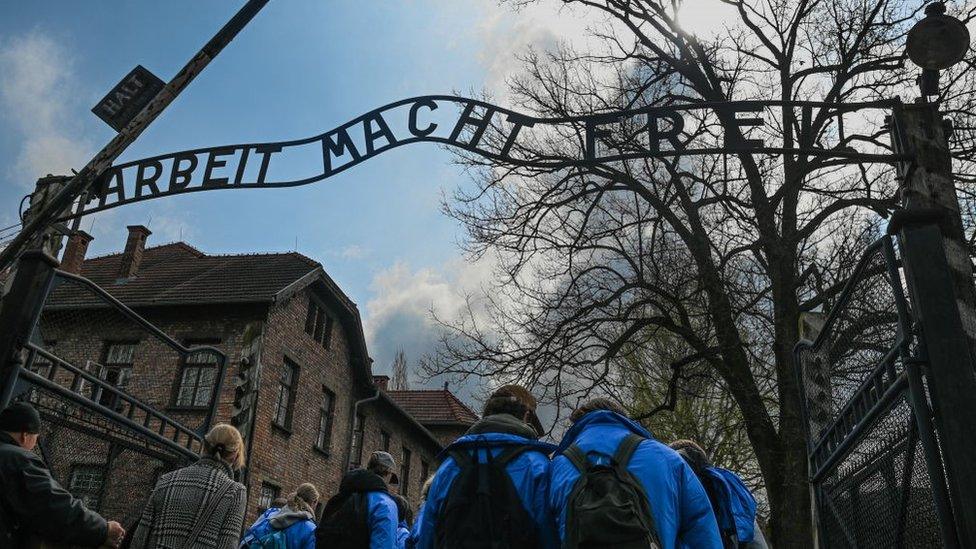Hubert Aiwanger: Bavarian deputy leader keeps job after antisemitism claims
- Published

Hubert Aiwanger has denied writing an antisemitic pamphlet when he was a teenager in the 1980s
The deputy premier of the German state of Bavaria, Hubert Aiwanger, will stay in his post following controversy concerning an antisemitic pamphlet written in the 1980s.
The populist leader denied writing a leaflet which mocked the Holocaust.
But he admitted carrying "one or several" copies as a school boy.
Bavaria's conservative leader Markus Söder said on Sunday it would be disproportionate to fire his deputy and coalition partner.
"Hardly any of us today are the same as we were when we were 16," Mr Söder said, referring to the age his colleague had been when he was in possession of the typewritten pamphlet 35 years ago.
The leaflet talked of a fictitious competition to find "who is the biggest traitor to the Fatherland", with a first prize of a "free flight through the chimney in Auschwitz".
The Auschwitz extermination camp was at the heart of the Nazi genocide of six million Jews in World War Two. Of 1.1 million people murdered at Auschwitz, about a million were Jews.
"Now what I said from the beginning is confirmed: There is no reason to fire me, the campaign against me has failed," wrote Mr Aiwanger on X, formerly known as Twitter, in response to Mr Söder's decision.
"We must now return to day-to-day work for our country so that Bavaria can continue to be governed stably and sensibly from the fall."
Earlier this month, a story about Mr Aiwanger's connection to the leaflet appeared in the left-leaning Süddeutsche Zeitung newspaper.
In response, Mr Söder asked Mr Aiwanger to reply to 25 questions on the controversy. He said on Sunday the response to some of these had not been satisfactory and he criticised his deputy for not apologising sooner.
However, the Bavarian premier added that although the leaflet was "disgusting, repugnant, contemptuous of people and absolute Nazi jargon" - there was no evidence Mr Aiwanger had written it.
His brother, Helmut Aiwanger, had already said he wrote the pamphlet when he was still a boy and now regretted his actions.
And Hubert Aiwanger subsequently apologised for what he said were mistakes made in his youth.
Mr Söder said that, in deciding in response, he had taken into consideration Mr Aiwanger's apology - and the facts he had shown remorse and had done nothing comparable since then.
But he added that leaders of Bavaria's governing coalition had agreed it was important that Mr Aiwanger "work on winning back lost trust," and that he should hold talks with Jewish community leaders.
"My sincere and well-intentioned advice, even if all those things happened a long time ago, it is important to show remorse and humility."
Bavaria holds key elections on 8 October.
Free Voters are set to win 11-14% of the vote next month but if their support implodes Mr Söder's conservative Christian Social Union would be in trouble.
His ambitions for one day taking on the role of German chancellor are already being dashed by poor poll numbers. Without Free Voters, his party would have the tricky task of trying to win over the left-leaning Green Party - a hate figure for many Bavarian conservatives.
With key votes in eastern German states next year and national elections in 2025, what happens in Bavaria in October's election will have a big impact in German politics.
The AfD has reached record poll numbers of more than 20% across Germany, and the conservatives in Bavaria have a difficult balancing act.
If they stray too far into nationalist territory, as some believe Mr Aiwanger has done, centrist voters will be scared off. But many right-wingers in Bavaria clearly believe they can fight off the AfD by mimicking its far-right rhetoric.
Related topics
- Published29 August 2023

- Published27 January

- Published31 May 2023
